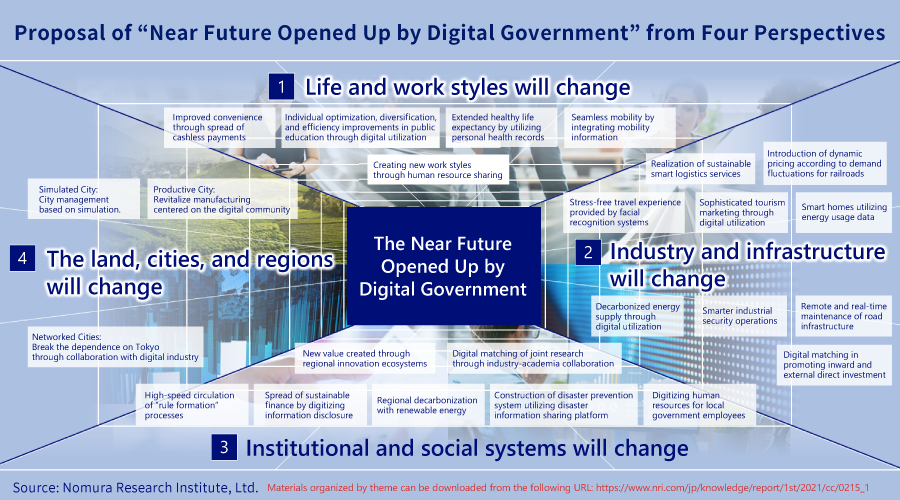
What Kind of Future Do We Envision with Digital Government and What Kind of Social Change Will Be Created?
While the spread of Covid-19 has accelerated the digitalization of society, the lag in the digitalization of administrative services has become apparent. The necessity and importance of “digital government” will increase in our uncertain and drastically changing society going forward. In promoting digital government, what sort of society are we aiming for, and what kind of future do we envision? And in the process, how do you spur innovation? We interviewed Tadashi Mizuishi, Atsushi Okamura, Soichiro Okamoto, Kazuki Mori, Mitsuru Deguchi, and Taro Shimura of Nomura Research Institute (NRI).
The importance of digital government, in the spotlight again
With the spread of Covid-19, the importance of digital government is in the spotlight again. At the same time, the importance not only of digitizing existing administrative processes and procedures, but of also transforming the administrative mechanisms and roles themselves in a digitalized society through the use of digital technology, has been cast into relief.
JOIN, a pioneering example of digital government, is a citizen-participation policy-making platform in Taiwan, a system in which citizens, not the government, set social issues themselves, and the government gives an answer on a response within 60 days to proposals that have gained a certain level of support. The government’s role is to support or complement the proposals originated by citizens.
Digital government will change the very ways of society; what sort of future will it open up? NRI is making proposals from four perspectives: “life and work styles will change”, “industry and infrastructure will change”, “institutional and social systems will change”, and “the land, cities, and regions will change”.

Four potential near futures that digital government will open up
“Life and work styles will change”
In the field of education, for example, education utilizing digital technology has begun against the backdrop of the GIGA school concept. The major difference from conventional public education is that the problems that children and students are presented with to tackle are individually optimized according to their proficiency levels. It is important for teachers not only to give lessons, but also to watch over children’s learning situations, checking for instance whether they understand the problems and whether their motivation is steady, and to consult and give advice.
In addition, digital utilization will enable us to quickly grasp and analyze information on learning and growth, which will make it possible to flexibly formulate evidence-based education policies.
“Industry and infrastructure will change”
Japan’s attempts at e-government are steadily progressing, but the current situation is that these moves have not resulted in sufficiently improved labor productivity and life quality. The points of change are “remotization/automation”, “ultimate optimization”, and “immediate/variable”. In other words, we will shift from on-site manual work to remote and automated services, promote ultimate optimization of services driven by big data, and shift from uniform and comprehensive services to immediate and variable services. For example, if plant safety operations that require a high degree of skill are automated, monitoring is performed in real time with cameras and sensors, and emergency response is handled by drones or rovers, production processes can be optimized, failures and accidents can be prevented, and business efficiency and safety can be improved.
To achieve this, it is necessary to share security data that is restricted to internal use on a cross-industry data platform while ensuring security and anonymity. Through this, the amount of information required for AI-based operations can be secured, and production and maintenance processes can be optimized.
“Institutional and social systems will change”
There is a movement to change the career path of single-track and lifetime employment throughout Japan. However, the current situation is that regular employees who are actually employed by companies still have a low rate of side jobs and concurrent employment. The key to overcoming this and promoting human resource sharing is the formation of a community of multiple companies. The idea is to share human resources among multiple companies and local governments, with one company/local government serving as the central axis. By promoting the mobilization of human resources by utilizing secondment etc. while making employment contracts based on the premise of medium- to long-term success in one company/local government, workers can realize career formation that transcends the boundaries of companies and local governments, and reduce the risk of unemployment by distributing employment. The biggest point for companies and local governments is to reduce the risk of personnel outflow. To achieve this, it is necessary for the national and local governments etc. to subsidize wage disparities, support matching for community formation, and build and provide human resources information databases and human resources management systems across companies etc.
“The land, cities, and regions will change”
NRI advocates three directions as an image of the future of the land and cities. The first is “Simulated City”, or city management based on simulation. The idea is to grasp and analyze the flow of cars and people, environmental measurement information such as CO2 levels, and the like and to reflect these things in policies in real time to solve these urban issues.
The second is “Productive City”, which aims to revitalize manufacturing centered on the digital community. The idea is that if each city has a “knowledge sharing mechanism”, “shared manufacturing environment”, and “practical test opportunities provided for the city”, with digital technology serving as the core, citizen-participation-type manufacturing cycles rooted in that city will be created, and it could eventually lead to the creation of new industries.
The third is “Networked Cities”, which aims to break the dependence on Tokyo through collaboration with digital industry. There are companies with excellent resources and technological capabilities in rural areas. The idea is that local governments can act on their own initiative to connect with each other over distance, creating new industrial and economic development originating in rural areas.
Toward the promotion of digital government
What is needed going forward to promote digital government is the formulation of a study platform that involves various stakeholders including as the government, private companies, and residents.
Further, it is expected that the national and local governments will create frameworks and mechanisms to strengthen (1) collaboration between the national and local governments, (2) collaboration between the public and private sectors, and (3) collaboration within cities and regions (local governments). For example, with respect to (1), it is important for the national government to develop a nationwide common system infrastructure, and then to reinforce local self-led strategies that take into account the circumstances and characteristics unique to each region. Regarding (2), technical development such as for authentication, integration, security could be carried out in collaboration with the public and private companies, and regarding (3), the cities and regions (local governments) could collaborate to form organizations and career-building programs that can be used to provide administrative staff with knowledge and experience in digitalization.
NRI will support the formulation of various study platforms for the promotion of digital government, and will continue to make various recommendations going forward.
Profile
-
Tadashi Mizuishi
-
General Manager
-
Atsushi Okamura
-
Soichiro Okamoto
-
Kazuki Mori
-
Mitsuru Deguchi
-
Taro Shimura
* Organization names and job titles may differ from the current version.